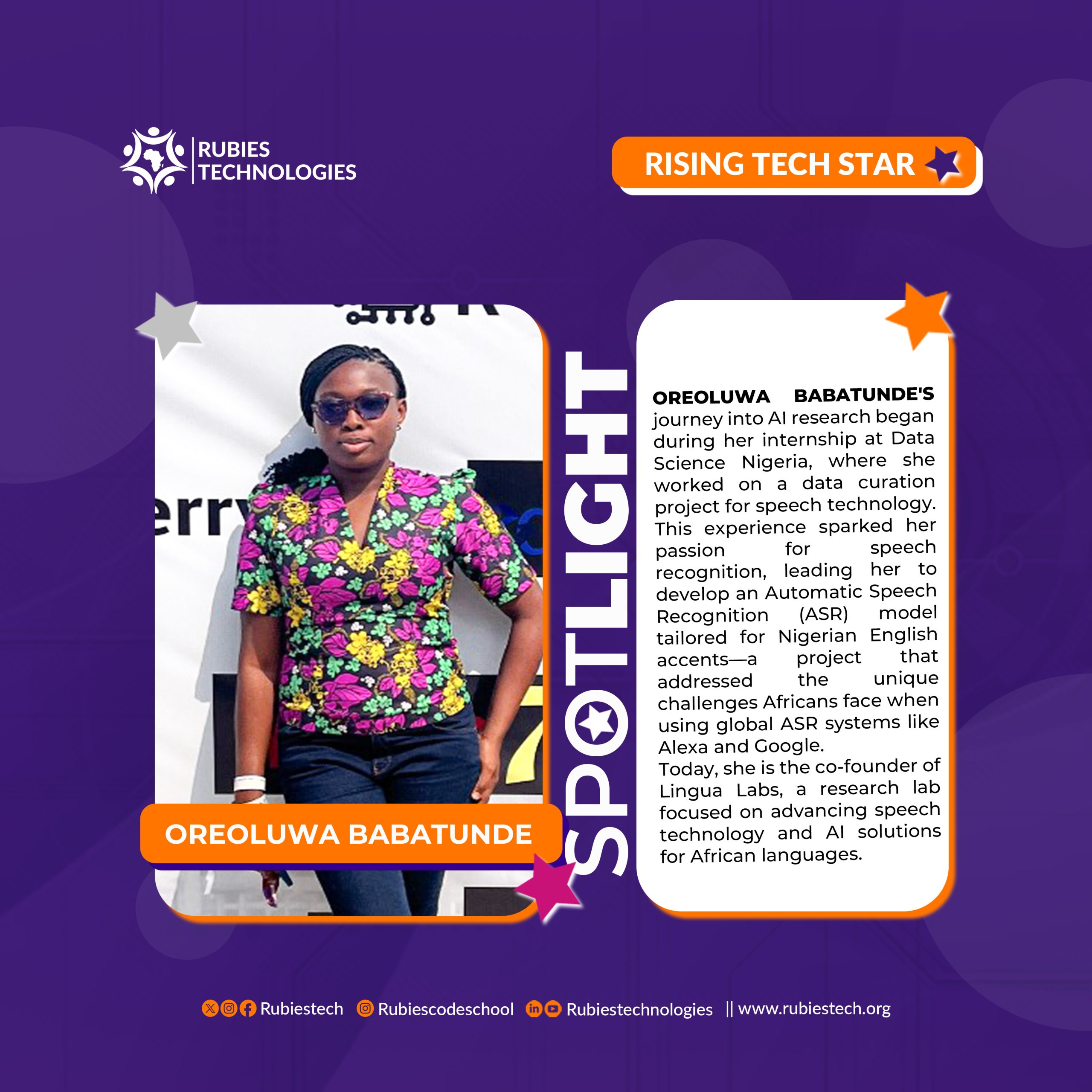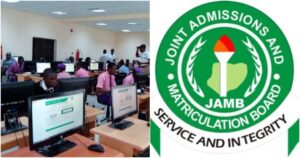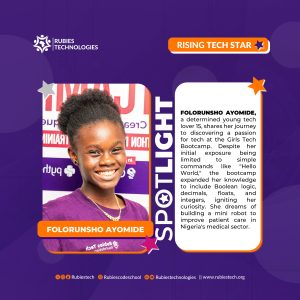At just 21 years old, Oreoluwa Boluwatife Babatunde is already making waves in the world of artificial intelligence. A graduate of computer science from Olabisi Onabanjo University, Oreoluwa’s journey into AI research began during her internship at Data Science Nigeria, where she worked on a data curation project for speech technology. This experience sparked her passion for speech recognition, leading her to develop an Automatic Speech Recognition (ASR) model tailored for Nigerian English accents—a project that addressed the unique challenges Africans face when using global ASR systems like Alexa and Google.
Her groundbreaking work didn’t stop there. Oreoluwa went on to present her research at the Deep Learning Indaba Conference in Ghana and later at the prestigious Black in AI Conference in the US. Today, she is the co-founder of LynguaLabs, a research lab focused on advancing speech technology and AI solutions for African languages.
In this interview, Oreoluwa shares her inspiring journey, the challenges of building AI systems in Nigeria, and her vision for a future where African data drives innovation. She also offers valuable advice for young people aspiring to break into tech and emphasizes the importance of humility, teachability, and perseverance.
Can you tell us more about yourself?
Oreoluwa: My name is Oreoluwa Oluwatife Babatunde. I’m a graduate of computer science from Olabisi Onabanjo University. I am 21 years old, and I’m an AI researcher. My journey began when I started research in my second year (200 level) in 2021. At that time, I was doing my internship at Data Science Nigeria, which was supposed to be for six months. However, due to the strike, I ended up interning for one year. That year marked the beginning of my transformation.
Let me give you a backstory. Data Science Nigeria is an AI company in Nigeria that focuses on machine learning (ML), data science, and AI in general. During my internship there, I met like-minded people who guided me, and that was where I started my research journey. I remember being there and trying to find a project topic for my final year. As a Nigerian student, you have to complete a final year project to graduate. I was thinking about what I could do, and I ended up working on a data curation project for a speech technology product. I was curating and cleaning data, which helped me learn more about speech data and speech recognition. For my final year project, I worked on automatic speech recognition (ASR) for Nigerian English accents. I developed an ASR model that works specifically for Nigerian English.
You see, most times when Africans or Nigerians use popular ASR systems like Alexa or Google, the systems don’t accurately transcribe what we say because of our accents and pronunciation. Even though we’re speaking the same language, our English differs from American English. These systems were built using American data, so they don’t work well for us. What I did was gather Nigerian data and build a system tailored to our accents. After completing the project, I submitted it and moved forward.
Later, I learned about the Deep Learning Indaba Conference, a conference for student and career researchers interested in AI. To attend, I needed to submit a paper. I revisited my 400-level project, where I had initially used one model. This time, I used three models, evaluated them, and determined which worked best for our data. My paper was accepted, and I presented it in Ghana. Fast forward to December 2023, I got the opportunity to present at Black in AI, which had always been a dream of mine. My first paper submission to Black in AI was rejected, but I collaborated with a friend (now my co-founder) to improve it. We resubmitted, and it was accepted. We presented it in the US, and that has been my journey so far.
Last year, I worked as an intern at Intron Health, an AI startup focused on speech technology and processes. The company provides speech technology services to hospitals in the US, Nigeria, and Africa. I worked there for seven months. After that, my friend and I founded our research lab, Lingua Labs, where we have contributors and work on various projects.
How did you develop an interest in technology?
Well, I initially wanted to become a doctor. But in Nigeria, when you write the JAMB exam and it doesn’t go well, you’re left with limited options. When I got my JAMB results, my dad sat me down and said, “This score isn’t enough for medical school.” My dad loves computers and agriculture, so he gave me three options: agricultural science, agricultural economics, or computer science. I didn’t like computer science in secondary school, but given my JAMB score and the reality of the situation, I chose computer science. My dad explained that it would lead to a good job. I had also heard about the opportunities in IT, so I decided to give it a try. My uncles encouraged me, saying that people working with computers in their offices earned good salaries. Even when I got admitted, I didn’t know much about AI until my third year when I was planning for my internship. That’s when I started learning about AI.
How do you feel now, having a good knowledge of computer science?
I often tell myself that I can’t imagine not doing what I’m doing now. I love what I do, and I put my all into it. It’s something I’ve enjoyed so far. I don’t think I’d be more fulfilled doing anything else. I love the opportunities it brings. Through research, I’ve learned so much. Instead of just coding, I understand why things work the way they do.
If given the opportunity, what sector do you think you can contribute to in Nigeria?
I have a couple of areas in mind, but the first is data storage. We don’t have proper databases or data storage systems in Nigeria, which is why some technologies can’t be built here. For example, I have a friend who lost an eye to a disease. She wanted to work on an AI solution for eye-related issues, but when she went to hospitals in Nigeria to gather data, she was taken to a room full of files and told to start searching. It’s overwhelming and inefficient. We lack proper databases, and data is expensive and hard to obtain. This is a major setback.
When I was working on my final year project, I had to create my own dataset because of the lack of available data. I spent hours recording speech data just to have one hour of usable data. Some people even pay for data. I believe improving data gathering, curation, and storage is crucial. Without proper data, we can’t build AI solutions that can bring positive changes, especially in areas like healthcare. Data is the foundation of everything in AI.
How many programming languages do you work with right now?
For now, I only work with Python.
Where do you see yourself in the next five years?
By the special grace of God, I will have completed my doctorate degree, started a family, and had children. I also hope to have published numerous research papers in top conferences, contributed significantly to the body of knowledge in AI, and given back to the community. I see LynguaLabs growing significantly, hosting bootcamps, both virtual and physical, focused on AI and speech technology.
What advice do you have for young people looking to start a career in tech, and what advice do you have for parents?
My advice to young people is to just start. You don’t know what you’re capable of until you begin. When I wanted to start my research lab, I had doubts—what if it doesn’t work? What if people say I’m too young? But you have to take that step. It’s your life, and you have to make the decision. Yes, there will be challenges, but you have to start and remain hopeful. Be committed, intentional, and willing to learn. Humility is key. The Bible says God lifts up the humble and resists the proud. Be humble and teachable. Learn from those who have gone ahead of you. Don’t see them as competitors; learn from their experiences to avoid making the same mistakes. Surround yourself with the right circle of friends who will push you to be better.
For parents, please encourage your children. Tell them they can do it and motivate them. When I wanted to travel to the US to present my paper, I never imagined it would happen. But when the opportunity came, my parents supported me. If they had discouraged me, I wouldn’t have gotten this far. Parents should provide basic support like internet access and electricity, which are essential for learning. Pray for your children and motivate them. My dad has always supported me, even though he’s not into programming. His encouragement has been invaluable.



